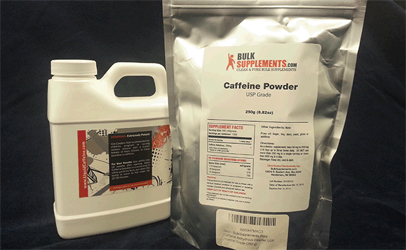 The U.S. Food and Drug Administration (FDA) is taking steps to help prevent more deaths from the use of pure powdered caffeine. Last week, the agency issued warning letters to five distributors of powdered caffeine, stating that their products are adulterated “because they are dietary supplements that present a significant or unreasonable risk of illness or injury under the conditions of use recommended or suggested in the labeling.” The companies are: SPN LLC (dba, Smartpowders) of Graham, NC, Purebulk Inc. of Roseburg, OR, Kreativ Health Inc. (dba, Natural Food Supplements) of Conoga Park, CA, Hard Eight Nutrition LLC of Henderson, NV, and Bridge City LLC of Portland, OR. The difference between a safe amount and a toxic dose of caffeine in these pure powdered products is very small, and safe quantities are nearly impossible to accurately measure with common kitchen measuring tools, FDA said in a constituent update posted Tuesday. “Volume measures, such as teaspoons, are not precise enough to calculate how many milligrams of caffeine are in the serving size,” the agency said. One teaspoon of pure powdered caffeine is equivalent to the amount of caffeine in about 28 cups of regular coffee. Last year, two young men died after ingesting caffeine powder, and FDA advised consumers about the dangers of such products. They can cause serious health effects, including rapid or dangerously erratic heartbeat, seizures and death. Vomiting, diarrhea, stupor and disorientation are also symptoms of caffeine toxicity. And pre-existing conditions can intensify the effects of caffeine and make the product more dangerous for these individuals. “The letters show progress on the issue, but the agency’s action today falls short of a comprehensive ban and recall of the product,” said Laura MacCleery, regulatory affairs director at the Center for Science in the Public Interest. “FDA has clear authority to ban such a hazardous product and should do so.” FDA said Tuesday it will continue to monitor the marketplace for powdered caffeine products and can address any violations with seizure of the product or an injunction preventing the company from continuing to manufacture or market the product. (To sign up for a free subscription to Food Safety News, click here.)
The U.S. Food and Drug Administration (FDA) is taking steps to help prevent more deaths from the use of pure powdered caffeine. Last week, the agency issued warning letters to five distributors of powdered caffeine, stating that their products are adulterated “because they are dietary supplements that present a significant or unreasonable risk of illness or injury under the conditions of use recommended or suggested in the labeling.” The companies are: SPN LLC (dba, Smartpowders) of Graham, NC, Purebulk Inc. of Roseburg, OR, Kreativ Health Inc. (dba, Natural Food Supplements) of Conoga Park, CA, Hard Eight Nutrition LLC of Henderson, NV, and Bridge City LLC of Portland, OR. The difference between a safe amount and a toxic dose of caffeine in these pure powdered products is very small, and safe quantities are nearly impossible to accurately measure with common kitchen measuring tools, FDA said in a constituent update posted Tuesday. “Volume measures, such as teaspoons, are not precise enough to calculate how many milligrams of caffeine are in the serving size,” the agency said. One teaspoon of pure powdered caffeine is equivalent to the amount of caffeine in about 28 cups of regular coffee. Last year, two young men died after ingesting caffeine powder, and FDA advised consumers about the dangers of such products. They can cause serious health effects, including rapid or dangerously erratic heartbeat, seizures and death. Vomiting, diarrhea, stupor and disorientation are also symptoms of caffeine toxicity. And pre-existing conditions can intensify the effects of caffeine and make the product more dangerous for these individuals. “The letters show progress on the issue, but the agency’s action today falls short of a comprehensive ban and recall of the product,” said Laura MacCleery, regulatory affairs director at the Center for Science in the Public Interest. “FDA has clear authority to ban such a hazardous product and should do so.” FDA said Tuesday it will continue to monitor the marketplace for powdered caffeine products and can address any violations with seizure of the product or an injunction preventing the company from continuing to manufacture or market the product. (To sign up for a free subscription to Food Safety News, click here.)
Sponsored by Marler Clark
